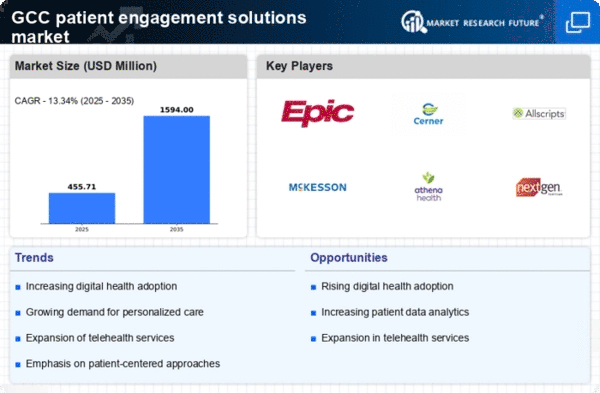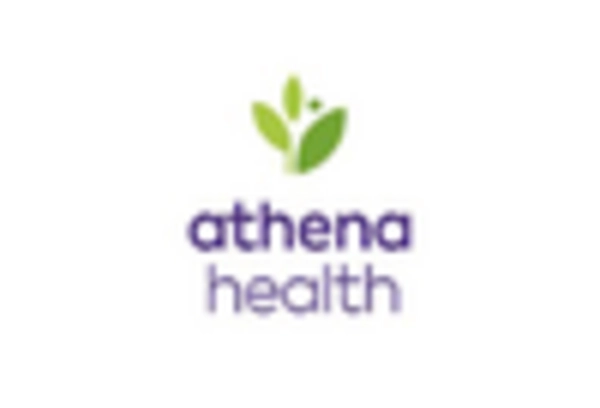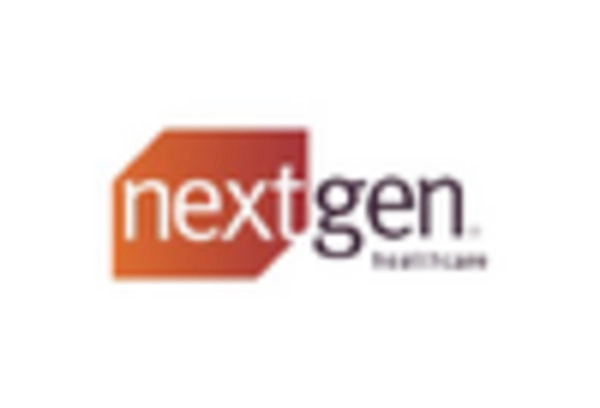Shift Towards Value-Based Care
The transition from volume-based to value-based care is reshaping the patient engagement-solutions market. In the GCC, healthcare providers are increasingly held accountable for patient outcomes, prompting a greater emphasis on patient engagement as a means to improve care quality. This shift encourages the adoption of solutions that facilitate better communication, shared decision-making, and patient feedback. As value-based care models gain traction, the patient engagement-solutions market is expected to expand, with providers seeking tools that align with these new reimbursement structures. The potential for improved patient satisfaction and health outcomes positions this market as a key area of investment for healthcare organizations.
Increased Focus on Health Literacy
Health literacy is becoming a critical factor in the patient engagement-solutions market, particularly in the GCC region. As healthcare systems strive to empower patients with knowledge about their health conditions, there is a growing emphasis on developing educational resources and tools that enhance understanding. This focus on health literacy is likely to drive the demand for patient engagement solutions that provide accessible information and support. Studies suggest that improving health literacy can lead to better health outcomes and reduced healthcare costs, which may further incentivize healthcare providers to invest in effective engagement strategies. Consequently, the patient engagement-solutions market is poised for growth as organizations prioritize health education.
Rising Demand for Personalized Care
The patient engagement solutions market is experiencing a notable shift towards personalized care, driven by patients' increasing expectations for tailored healthcare experiences. In the GCC region, healthcare providers are recognizing the importance of engaging patients in their treatment plans, which has led to a surge in demand for solutions that facilitate personalized communication and care pathways. This trend is reflected in the growing adoption of digital health tools, with a projected market growth rate of approximately 15% annually. As patients seek more control over their health decisions, the patient engagement-solutions market is likely to expand, offering innovative platforms that enhance patient-provider interactions and improve health outcomes.
Integration of Advanced Technologies
The integration of advanced technologies into healthcare systems is a significant driver for the patient engagement-solutions market. In the GCC, the adoption of artificial intelligence (AI), machine learning, and telehealth solutions is transforming how healthcare providers interact with patients. These technologies enable more efficient data collection and analysis, leading to improved patient engagement strategies. For instance, AI-driven chatbots are increasingly used to provide instant support and information to patients, enhancing their overall experience. The market for these technologies is expected to grow by around 20% in the coming years, indicating a robust demand for innovative patient engagement solutions that leverage technological advancements.
Growing Emphasis on Preventive Healthcare
Preventive healthcare is gaining traction in the GCC, significantly influencing the patient engagement-solutions market. As healthcare systems prioritize prevention over treatment, there is an increasing need for solutions that encourage proactive patient participation in health management. This trend is reflected in the rising adoption of mobile health applications and wearable devices that monitor health metrics and promote healthy behaviors. The market for preventive health solutions is projected to grow by approximately 18% annually, indicating a robust demand for patient engagement tools that support preventive care initiatives. By fostering a culture of prevention, the patient engagement-solutions market is likely to see sustained growth in the coming years.

















